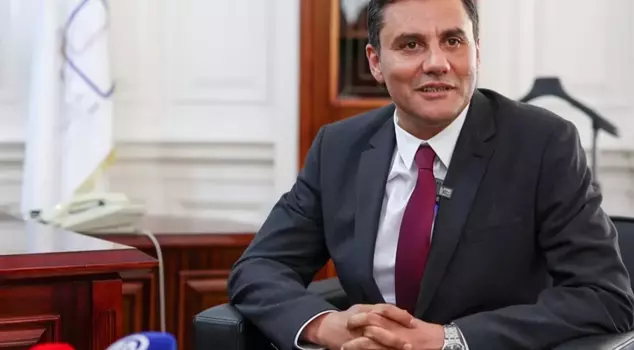
09.06.2025 12:00
Prof. Dr. İsmet Topçu made a statement regarding the health condition of Manisa Metropolitan Municipality Mayor Ferdi Zeyrek. Stating that "there is neither a good development nor a negative development," Topçu emphasized that they are continuing their efforts to heal the damaged organs over the course of the process. He noted that Zeyrek has serious damage to his heart and lungs.
Manisa Celal Bayar University Chief Physician Prof. Dr. İsmet Topçu made a statement regarding the health condition of Manisa Metropolitan Municipality Mayor Ferdi Zeyrek, who was electrocuted.
Prof. Dr. İsmet Topçu noted that Zeyrek's struggle for survival continues, stating, "At the moment, there is no clear development that we can say is good or bad. It is expected that the damaged organs will heal over time. Intensive care treatment is ongoing, and dialysis support is being continued," he said.
"WE ARE NOT CONSIDERING WAKE-UP"
Emphasizing that they are focused on maintaining Zeyrek's vital functions, Topçu stated, "There are serious damages to his heart and lungs. At this stage, we are not considering waking him up," he expressed.
Prof. Dr. Topçu said the following:
"THERE IS NO DIFFERENCE FROM YESTERDAY"
"As of today, our treatment continues at a high level in intensive care, just like yesterday, but when comparing yesterday and today, there is no positive development, nor is there a negative development. The current treatment and struggle for survival continue. All technical equipment needs are being met, and we have no issues. The processes of ensuring oxygenation of both the heart and lungs, as well as maintaining the kidney's dialysis functions, are ongoing in intensive care. The process continues with all necessary information and evaluations with experts on other relevant issues. There is no different development from yesterday.
"INTENSIVE CARE TREATMENT PROCESS CONTINUES"
During this process, we are in constant consultation with our rector, our esteemed governor, our minister, and our deputy ministers. Their support is very valuable for the motivation of our working team. We are continuing the intensive care treatment process in consultation with them.
There is no specific timeline like "this will happen in 48 hours, this will happen in 72 hours." The follow-up of intensive care processes for patients with serious damage is currently focused solely on survival and preventing potential complications. During this process, it is expected that the damaged organs will renew and heal themselves. If necessary, we provide support for oxygenation, better heart function, or improvement of brain functions. This process does not have a specific expression. The process of intensive care treatment continues.
"WE PERFORMED ARTIFICIAL DIALYSIS AS OF THE TIME HE ARRIVED"
As of the time he arrived, he was connected to dialysis. As a result, there was nothing to provide nourishment to the organs for a certain period. Because his heart had stopped for a long time. This, in turn, prevented the kidney from performing its function, like all organs. Therefore, we performed artificial dialysis as of the time he arrived. We continue to ensure the removal of blood or harmful substances from his body or the production of urine.
It is not in the form of an official scientific board, but a group of experts from various known branches with extensive experience in this field has been formed. This group is discussing and trying to do what is best. Subsequently, we continue the treatment process with the common wisdom created. At this stage of treatment, we are not considering waking him up; we find it premature according to the joint decision of the team. Right now, we are focused on maintaining his vital functions."
CHP Manisa Provincial Chairman Özalper stated that citizens and politicians came to the hospital to convey their good wishes and prayers, and he expressed his gratitude. Özalper said, "Our esteemed chairman has been here from morning until late at night. This is a hospital, and today is the last day of the holiday. Tomorrow, life will return to its normal routine. Celal Bayar University has approximately 6,000 to 7,000 patients and their relatives entering and exiting daily. Therefore, we will ask for a little more sensitivity on this matter," he said.